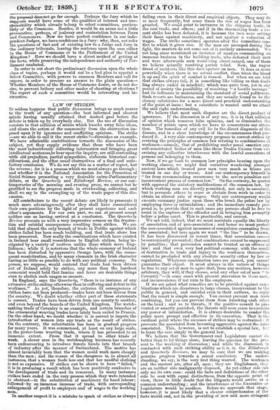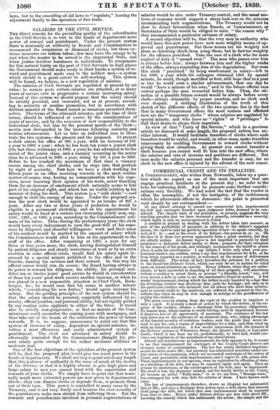LAW OF' STRIKES.
IT seldbm- happens that public discussion brings us much nearer to' the truth- of any question—the best informed and clearest minds- having usually- attained that desired gaol before the debate- is takenup by everybody else. But the use of dismission_ consists in that collision olminds-which knocks away false ideas, and clears the action of the-community from the obstruction im- posed upon- it by ignorance and oonflicting opinions. The strike —are we able to- call'it the recent strike-?—farnishes an example. We have' admirable contributions' towards the discussion of the subject, yet they' supply evidence' that those who have been the- most industriously collecting, information and' bringing great _intellectual acutenese.toliearupon the inquiry are still'contending with- ol&prejudieres, partial' sympathies, elaborate historical con- siderations; and the other usual' obstruct-fires of a final and satis- factory conclusion. We-do not say 'this- as a matter of regret, but the reverse ; for. it is a process which we mustalwaya go through ; and whether -it the National Association for the Promotion of. Social Science presenting' a very- desirable extra-Pailiamentary debate, or the Quarterly and Edinburgh. _Review;. or-our-con- temporaries of'the morning and evening press, we cannot but be gratified to see- the-progress made in- overhauling; collecting, and shall we say-in the crumplingup of the waste paper of this dis- cussion.
All contributors to the- recent debate are likely'to prosecute it much more advantageously after they shall have reconsidered their own.positions by the light of' present experience and each other's arguments: For our own part, we can at present accept neither one: as having; arrived at. a conclusion.. The Quarterly Review presents us with a very impressivesermonuff the frustra- tion and suicidal consequences resulting from- strikes. We are told' that almost the only branch of trade in Dublin against which strikes failed: has been coach building, and that trade alone has been preserved. Now really. the combinations which have existed in Ireland bear smalr resemblance to. English strikes, being in- stigate& by a variety of motives unlike those which move Eng- lishmen;, while it is notorious that the whole economy of Ireland has been disturbed by oppressive. Orange laws, with the conse- quent recalcitration, an&by many elements, in. the Irish character having as little as possible to do -with any political economy. No person, we' suppose, would contend that trade had been driven out of Ireland solely by strike& any more than the harshest economist would, hold. that famine an& fever are desirable things even to abolish suck' usages: as.conacre.
In England, says. the' Quarter/4y "there is-no instance of any- extensive strike ending otherwise than 'suffering and' defeat to the workmen."' As yet; therefore, the extreme ill consequences of strikes have. not been produced.—trades have notbeen driven from the country. We doubt whether either part of these statements is correct Trades- have lieen driven from one county to another, and even beyond the-bounds of the United' Kingdom. The watch-
making e of Coventry is an-example, and' certain branches of the ornamental weaving trades-have lately been exiled. to. Prussia. OnAhe other hand, we,doubt. whether it is. correct to impute the introduction, of women- into any trade as: the result of strikes. On-the contrary, the substitution- has been in gradual progress for many years. It was commenced, at least on any large scale, in the power-room. weaving trade,. where it has - proceeded. to an immense extent. From that it spread. to other kinds of work. A. clever- man in the watchmaking business has recently been endeavouring to introduce female hands- into that branch of industry after the manner of Switzerland.. The motive has almost invariably been that the women could work more cheaply than the men ; and the reason of. the cheapness is., in. almost all. inotancee, that a woman feeds less, and that her needful clothing is not so expensive. If strikes• can be shown to have "failed,"' it is in producing a result which has been positively 'conducive to the development of trade and its resources. In many instances strikes have ended in the. very process which they were intended to obstruct—in the substitution of machinery for hand labour; followed-by an immense increase of trade-, with corresponding enlargement of. profit. to. employers- and' of wages to the working men..
In another respect. it is a.raistake to speak of. striker' as-alvrays
failing even in their direct and empirical objects. They may do so most frequently, but some times the rise of wages has been granted. We could point to instances in the shipping trade, in the coal trade, and others ; and if in the shoemaking trade a re- ' cent strike has been defeated, it is because the men were setting their faces against machinery, and not against a reduction of wages. The strike sometimes operates after. the immediate con. diet to which it gives rise. If the men are soourged.during the fight, the masters do not come out of it entirely unwounded. We not long since mentioned an instance of masters commanding an immense business in the building trade, who defeated• their men and were afterwards seen wandering about ruined, one of them we believe actually receiving parish relief. Now, the vague dread of accidents like this does operate on men. It does so more powerfully when there is no actual conflict, than when the blood is up and the spirit of combat is roused. But when we are told. that strikes always.fail, it is something like telling us that duel- ling always ended in mischief ; which was quite true, yet in one period of society the possibility of receiving " a hostile message" had its influence in maintaining the standard of social politeness. Such resorts are barbarous, and they are usually found to be the clumsy substitutes for a more direct and practical. understanding of the point at issue ; but a substitute is wanted until we attain the said right understanding. We believe that moat such disputes are the direct product of ignorance. If the discussion is of any use, it is in that collision of opinion which removes false opinions and so diminishes the number of points upon which we have M concentrate our atten- tion. The remedies of any evil lie in the direct diagnosis of the disease, and in a clear knowledge of the circumstances that pro- duced it. A very able contemporary proposes to correct strikes by reviving the principles of common law relating to combinations of workmen—namely, that of prohibiting under penal sanction any self-constituted bodies of men like these Trades- Unions from ex- ercising any collective interference with the lawful avocations of persons not belonging to them.
Now, if we go back. to common law principles bearing upon the working classes, We might find ourselvesi wandering- amongst ancient laws which treated poor men very much as felons are treated in our day or worse. And our contemporary himself is "far from recommending recurrence to the severe penalties and inconvenient process of common law." Onthe contrary; he quotes with approval the statutory modifications of the common law, by whioll working men are directly permitted; not only to associate, but.to per se others to cease or abstain. from work in order to obtain an altered rate of wages. Only our contemporary would execute summary justice upon those who break the police law by employing force or intimidation ; and the immediate remedy pro- posed is, to provide that in such oases any persons shall be free to assist in the capture of the offender and in bringing him promptly before a police. oonrt. This is practicable, and correct;
We are told, indeed, that we must maintain equally, the liberty of association and of non-association ; and hence we must protect the non-associated against measures of compulsion emanating from the associated; but here again we want " the line " to be drawn. It has been discovered in recent times that association cannot , be conveniently prevented; that combinations cannotbe suppressed by. penalties ; that persuasion cannot be treated swan offence at law; and that even very bad political economy, with the result of destruction to trade and injury to the workmen themselves, cannot be precluded with any absolute security either by law or regulation. Whatever combination laws are passed, you cannot guarantee their. object. It must always in the nature of things be free to any set of men to agree that, from any motives, however arbitrary, they will, if they choose, send any other set of men " to Coventry "—in some cases with present starvation to these men, and inconvenience if not ruin to the employers.
If we are asked what remedies are to be provided against com- binations which are disastrous to large classes, inconvenient to the public in general, and suicidal even to their authors, we reply that the resort is simple enough. You cannot prevent men from combining, but you can prevent them from knocking each other on the head • and as to threats, if the positive assault be pre- vented or smartly punished, the threats will soon cease to exercise any power of intimidation. It is always desirable to, render the police more prompt and effective in its execution. That Is the cardinal point where the excesses of strikes may be restrained : it prevents the associated from becoming aggressive against the non- associated. This, however, is not to establish a special law, but to leave the case simply to the general law.
We believe that the Government and Legislature cannot do better than to let things alone, leaving the question for the pre- sent to the working of discussion ; and while the discussion is conducted with such striking ability as it is in the Edinburgh and Quarterly Reviews, we may be sure that we are making genuine progress towards a sound conclusion. The under- standing, we say, is the very first thing wanted. The workmen and the masters are, after all, men ; they are Englishmen, they are on neither' side Malignantly disposed. As yet either side can only see its own case : could the facts and deductions of the other side be seen with equal distinctness, from the opposite point of view, there is little doubt that the litigants would arrive at a common understanding ; and the interference of the Executive or. Legislature would be needless. Before we approach that stage, however, it is most likely that a clearer comprehension of the facts would end, not in-the providing of new and more stringent-
laws, but in the cancelling of old laws to " regulate," leaving the adjustment finally to the operation of free trade.



























 Previous page
Previous page